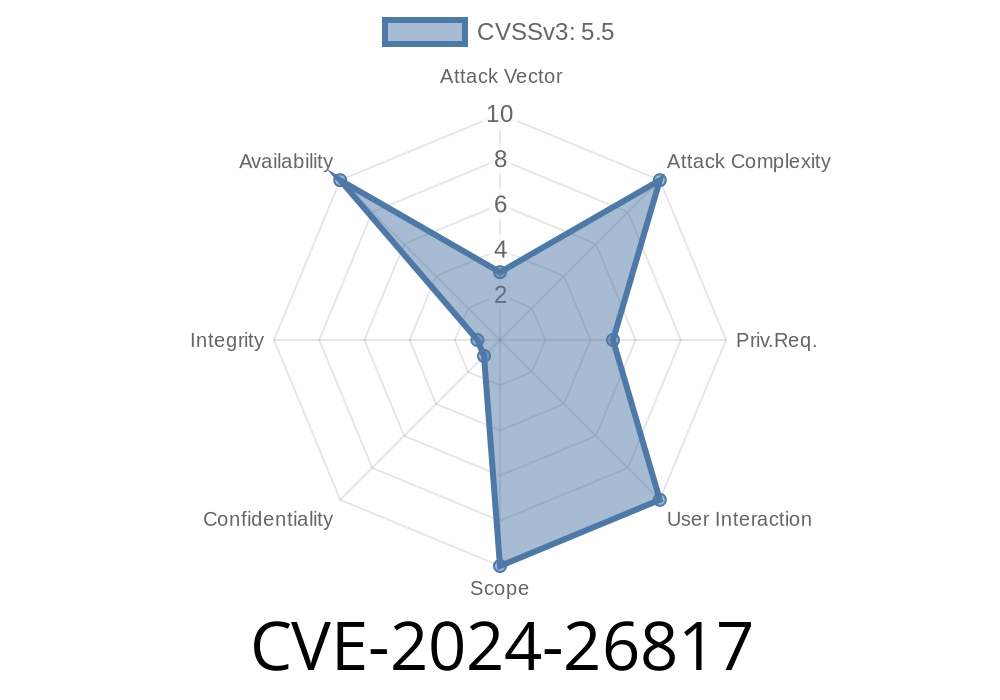The Linux kernel is the backbone of most modern computers, from servers to desktops and even IoT gadgets. Security vulnerabilities in something so foundational can have serious, wide-reaching consequences. One such issue has been recently identified and patched in the Linux kernel’s AMD GPU subsystem. Let’s take a detailed look at CVE-2024-26817, explore how it happened, what the risks are, and what you need to know to stay secure.
What is CVE-2024-26817?
CVE-2024-26817 refers to a vulnerability in the Linux kernel’s amdkfd driver (which is part of AMD’s GPU support). This flaw came from an unsafe memory allocation pattern that could cause an integer overflow, potentially leading to out-of-bounds memory writes, kernel panics, or even privilege escalation in worst-case scenarios.
In the vulnerable code, developers used kzalloc() to allocate memory
// Old code (vulnerable)
void *ptr = kzalloc(n * size, GFP_KERNEL);
The bug happens if n * size (number of elements times their size) exceeds the maximum value representable by the data type (usually size_t). This "integer overflow" means less memory is allocated than expected, leaving part of the intended buffer unallocated. Later, the kernel might write past the allocated memory — triggering a buffer overflow, crash, or possible exploitation.
To fix this, the code was changed to use kcalloc(), which protects against integer overflows internally:
// Fixed code (safe)
void *ptr = kcalloc(n, size, GFP_KERNEL);
kcalloc() multiplies n and size safely, returning NULL if overflow occurs.
Exploitation Scenario: How Could an Attacker Use This?
Suppose a bug like this existed in a code path accessible to untrusted users (e.g., through device drivers like amdkfd, used for AMD GPUs). A malicious user might:
Gain Kernel Memory Corruption:
- When the kernel writes past the allocated buffer, they could corrupt adjacent memory, potentially leading to a crash (DoS) or, in rare cases, even arbitrary code execution.
Example
// Example allocation (n and size come from user input)
int *arr = kzalloc(user_n * sizeof(int), GFP_KERNEL);
If user_n is very large, user_n * sizeof(int) could wrap around back to a small number — allocating a too-tiny buffer and causing later code to write outside of its bounds.
Proof-of-Concept (PoC) [Pseudocode]
The actual exploitability would depend on exactly how those values flow into kzalloc(). Here is a simplified pseudocode to illustrate the problem:
// Suppose this is in a driver syscall handler:
unsigned long n = copy_from_user();
if (n > LIMIT) // Insufficient check
return -EINVAL;
int *buffer = kzalloc(n * sizeof(int), GFP_KERNEL);
if (!buffer)
return -ENOMEM;
// Now kernel code starts writing to buffer[..n-1], but buffer is undersized
for (unsigned long i = ; i < n; i++) {
buffer[i] = i; // Buffer overrun if n*size overflowed
}
With a large enough n, the real allocation might be just 4 bytes, but the kernel would write hundreds of bytes, stomping over adjacent kernel memory.
Patch and References
The Fix:
Linux kernel maintainers swiftly patched the code by replacing kzalloc with kcalloc, which performs the multiplication with overflow checking.
Relevant commit reference:
- Linux kernel commit fixing CVE-2024-26817
CVE Record:
- NVD - CVE-2024-26817
- oss-security mailing list announcement (if available)
How bad is it?
- In practice, you’d need some way for untrusted input to reach the allocation. It might be local privilege escalation or just a denial-of-service through kernel panic.
Conclusion
The CVE-2024-26817 bug is another reminder that low-level code with unsigned math can undermine even the best system security. The fix is simple — swap kzalloc for kcalloc — but the consequences of missing this can be catastrophic. For end users, keep systems up-to-date, and for developers, *always* use safe allocation APIs.
For more details, check out the official Linux kernel patch and stay tuned to trusted advisories like NVD's CVE-2024-26817 entry.
Timeline
Published on: 04/13/2024 12:15:11 UTC
Last modified on: 02/03/2025 16:17:45 UTC
